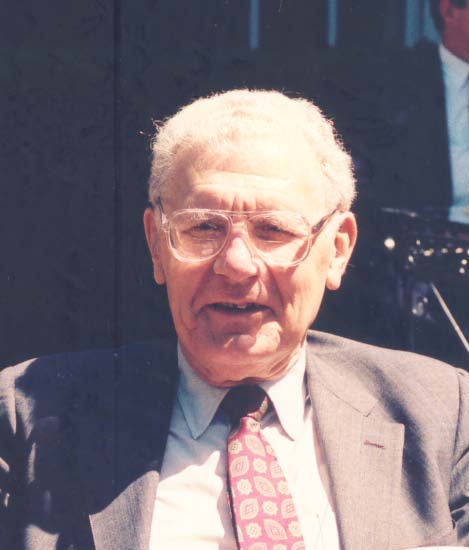Creating the Corporate Future: Plan or Be Planned for
Frases célebres de Russell L. Ackoff
Creating the Corporate Future: Plan or Be Planned for
Creating the Corporate Future: Plan or Be Planned for
Russell L. Ackoff: Frases en inglés
Cited in: Haluk Demirkan, James C. Spohrer, Vikas Krishna (2011) The Science of Service Systems. p. 274.
1970s, Towards a System of Systems Concepts, 1971
Fuente: 1980s, Creating the Corporate Future, 1981, p. ix in the Preface: "Creating the Corporate Future: Plan or be Planned For," Wiley, April 27, 1981
Fuente: 1970s, Redesigning the future, 1974, p. 21.
“The less sure managers are of their opinions, the more vigorously they defend them.”
Fuente: 2000s, A little book of f-laws: 13 common sins of management, 2006, p. 8, bold text cited in: Gregory H. Watson (2010).
Contexto: The less sure managers are of their opinions, the more vigorously they defend them. Managers do not waste their time defending beliefs they hold strongly – they just assert them. Nor do they bother to refute what they strongly believe is false.
“Managers who don't know how to measure what they want settle for wanting what they can measure.”
For example, those who want a high quality of work life but don't know how to measure it, often settle for wanting a high standard of living because they can measure it.
Fuente: 2000s, A little book of f-laws: 13 common sins of management, 2006, p. 4, bold text cited in: Colin J. Neill, Phillip A. Laplante, Joanna F. DeFranco (2011) Antipatterns: Managing Software Organizations and People.
“The only managers that have simple problems have simple minds.”
Ackoff (2007) as cited in: Stefan Stern (2009) "Fond farewell to a brilliant thinker". in: Financial Times, November 9, 2009.
2000s
Contexto: The only problems that have simple solutions are simple problems. The only managers that have simple problems have simple minds. Problems that arise in organisations are almost always the product of interactions of parts, never the action of a single part. Complex problems do not have simple solutions.
Charles West Churchman, Russell Lincoln Ackoff (1950) Methods of inquiry: an introduction to philosophy and scientific method. p. 185; Partly cited in: Britton, G. A., & McCallion, H. (1994). An overview of the Singer/Churchman/Ackoff school of thought. Systems Practice, Vol 7 (5), 487-521.
1950s
Contexto: … All other languages can be translated into the thing-language, but the thing-language cannot be translated into any other language. Its terms can only be reduced to what are called "ostensive" definitions. These consist merely of pointing or otherwise evoking a direct experience. Hence, the thing-language is absolutely basic. Out of this basic language, we build up the other languages of the sciences, beginning with the language of physics, and proceeding to biology, psychology, and the social sciences.
“The less important an issue is, the more time managers spend discussing it.”
Fuente: 2000s, A little book of f-laws: 13 common sins of management, 2006, p. 16, bold text cited in: Gerald Haigh (2008) Inspirational, and Cautionary Tales for Would-be School Leaders. p. 142.
Contexto: The less important an issue is, the more time managers spend discussing it. More time is spent on small talk than is spent on large talk. Most talk is about what matters least. What matters least is what most of us know most about.
1970s, Towards a System of Systems Concepts, 1971
Fuente: 1960s, Scientific method: optimizing applied research decisions, 1962, p. 340 as cited in: Philosophica gandensia, Vol.6-7 (1968). p. 141.
As cited in: Problem Solving & Goal Setting blog, 24 October 2010.
1970s, The Art of Problem Solving, 1978
Fuente: 1990s, Re-Creating the Corporation (1999), p. 4.
Towards a Systems Theory of Organization, 1985, From Data to Wisdom, 1989
Russell L. Ackoff and Fred Emery (1972) On purposeful systems, cited in: Lloyd Dobyns, Clare Crawford-Mason (1994) Thinking about quality: progress, wisdom, and the Deming philosophy. p. 40.
1970s
1970s, The Art of Problem Solving, 1978
Fuente: 1970s, Redesigning the future, 1974, p. 10.
Ackoff (1973) "Science in the Systems Age: beyond IE, OR and MS." in: Operations Research Vol 21, pp. 664.
1970s
Fuente: 1960s, Scientific method: optimizing applied research decisions, 1962, p. 108 as cited in: Joe H. Ward, Earl Jennings (1973) Introduction to linear models. p. 4.
Fuente: 1990s, Re-Creating the Corporation (1999), p. 83.
Ackoff’s (1994) The Democratic Corporation: A Radical Prescription for Recreating Corporate America and Rediscovering Success. p. 117 cited in: Stuart A. Umpleby and Eric B. Dent. (1999) "The Origins and Purposes of Several Traditions. in Systems Theory and Cybernetics". in Cybernetics and Systems: An International Journal, Vol 30. pp. 79-103.
1990s
“Over time, every way of thinking generates important problems that it cannot solve.”
Fuente: 1990s, Re-Creating the Corporation (1999), p. 3. Opening sentence.
Fuente: 1960s, Management misinformation systems, 1967, p. 148.
Towards a Systems Theory of Organization, 1985, From Data to Wisdom, 1989
Fuente: 1970s, On purposeful systems., 1972, p. 145, as cited in: Galjaard (2009, p. 89): About the information-concept of Ackoff.
Fuente: 1970s, On purposeful systems., 1972, p. 237, as cited in: William E. Smith (2008) The Creative Power. p. 58.
Ackoff (1994, p. 71) cited in: James P. Lewis (2002) Working Together: 12 Principles for Achieving Excellence. p. 35.
1990s
As cited in: Jeff A. Riley and Kemal A. Delic (2010) "Enterprise Knowledge Clouds". In: Handbook of Cloud Computing. Borko Furht, Armando Escalante ed. Springer 2010.
Towards a Systems Theory of Organization, 1985, From Data to Wisdom, 1989
Ackoff (1999, p. 34) cited in: Michael C. Jackson (2000) Systems Approaches to Management. p. 234.
1990s
Fuente: 1960s, Management misinformation systems, 1967, p. 147.
